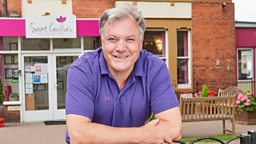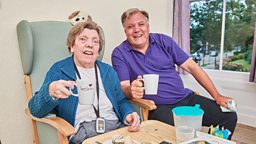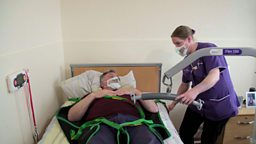Inside the Care Crisis with Ed Balls
Ed Balls sets off to find out what life is really like on the front line for those who work in elderly social care and the people they serve. In the first episode Ed goes to live and work in St Cecilia’s in Scarborough, a typical family-run mid-sized business.
This documentary is personal for Ed. For many years his Mum has had dementia and for the last three has been in a care home; he also feels guilty that when he was in government, he failed to tackle the care sector crisis.
His exploration is timely. After a decade where £8 billion of cuts have been made to care spending, the pandemic dealt a blow which left the sector on its knees.
With the Government promising to raise money for health and social care through a National Insurance rise, Ed wants to find out from the people on the ground what the biggest issues are.

What made you want to cover this topic?
Social care is an issue that matters for all of us. I came into this as someone who has engaged with social care a great deal over the last 15 years both as an MP and Treasury Minister and also as a son because my Mum has been in a care home for three years now. As a result I started out thinking I knew what social care was all about and was shocked to discover how little I knew and how much I had to learn. Even as a family member, with my Mum in a care home, I didn’t realise how personal, difficult and challenging it would be to work as a carer.
What preparation did you undergo before working at the care home?
Like any new recruit, before I started, I spent a whole weekend doing online training: care management, basic hygiene, basic food hygiene, dementia awareness, moving and handling. When I arrived at St Cecilia’s I then did practical training both to learn to use the hoist but also for me to experience what it was like to be cared for. The ethos is that this is someone’s home and they must have agency and be in charge. Your job as a carer is to help them choose and stay in control where possible - what soap do you like? How hot do you want the water? What would you like to wear? I don’t think I fully appreciated beforehand how subtle and personal providing that kind of care is.
What was your understanding of ‘personal care’ before filming?
Every day on our family What’s App group chat we get messages saying ’Carolyn has had personal care and enjoyed her breakfast.’ In my mind this was mechanical with things being done by the carers. I don’t think I realised how personal and sensitive, and sometimes really challenging, the role of being a carer is. It’s hugely skilled and important and something I now understand, appreciate and value much more.
We see you visit your Mum who is at a care home in the first episode…?
We only decided that I should go to visit my Mum as part of the programme after filming was well under way. Partly because I found I was continually relating what I saw and did in Scarborough to what I thought I knew as a son with a Mum in social care. And, also because I was worried there would be lots of families who weren’t able to visit their loved ones for a long time during the pandemic and who had found that very hard and might be thinking: ‘Why is this guy being allowed to go and work in care homes when we weren’t allowed to go in?’ I thought it was important for me to show that I had experienced that huge worry and loss as well. When I go to see my Mum it’s for the first time in 16 months.

What else can we expect to see you do in the documentary?
In the second episode I get under the skin of both domiciliary care and unpaid caring while going back a few times to Scarborough to see how things are developing at St Cecilia’s.
I spend an exhausting day doing care in people’s homes in Liverpool - 16 separate visits between 7am and 9pm with a dedicated carer called John. At St Cecilia’s there is a team of skilled staff ready to help. John is usually alone. In half an hour we had to get the ‘client’ out of bed, commode done or change their pad, wash, dress, shave, medication, make the breakfast and a cup of tea, have a quick chat and then get out the door and onto the next visit. The skill and responsibility we ask of John is great and he is paid markedly less than £10 an hour. What are we doing as a society?
I also spend an emotionally draining day with an unpaid carer called Derek in Yorkshire whose wife has double incontinence and severe dementia. Derek cares for her alone every day, 365 days a year. His dedication, and that of Shahid who I visit in Rochdale and has an equally complex story to tell, is astonishing to see.
What did you find the most challenging whilst filming?
I have done things while making this film that I have never done in my life for somebody else and never expected to do. Of course I changed nappies for our kids when they were little and am trained in first aid. But I have never changed an adult’s pad, catheter or a stoma bag. I’ve never full body-washed an 80-year-old man or applied cream to the legs of a 94-year-old women. I’ve never shaved anyone before except myself. I did all these things but I learned to do them in a way that is reassuring, respectful and preserves their dignity. It was hugely challenging and also fulfilling.
The staff at St Cecilia’s told me that they always know within 24 hours whether a new staff member can do the job or not. So, for me, I think the hardest thing - with a camera on my shoulder - was discovering whether I could. It was a very difficult thing but I was with people who were incredibly skilled and helped me every step of the way.

You talk in the documentary about your ‘guilt’ – professional and personal – what do you mean?
The tax rise and huge injection of funding transformed the NHS in the early 2000s. But we didn’t do the same for social care and I feel guilty that we didn’t transform it and we have to try and understand why. Unlike in the fire service, the police or the NHS, I don’t think many people properly understood the scale, complexity and challenges of our social care system and how much onus we put on relatively low paid people to do impossibly difficult jobs. What this programme does is allow me and all of us to see what social care really is from the inside and that is why it is powerful.
Will we see you treating the residents to Gangnam Style?
No, definitely not! But I do know for my Mum and lots and lots of residents and staff in care homes that every now and then when it’s raining in February and everyone is feeling a bit gloomy, they put Gangnam Style on the TV and it makes the residents smile. My Mum always does, not least because every time she sees it, she is seeing it for the first time, and she can’t quite work out who this familiar looking guy is and it makes her roll her eyes.
How did you find fronting this style of programme?
This documentary is very much in the style of my Travels in Trumpland. There are no speeches from me, it’s not a current affairs film packed with my views. What it does is get me and all of us on the inside, we can see and listen to individual families and residents and carers and it then allows viewers to think ‘well how do I feel about this?’ And if people watch and think ‘I never knew that before’ and through understanding think ‘I care more now than I did before’ or ‘we have to value social care and all the people who work in it more in future’ then I will have succeeded.
To watch Inside the Care Crisis with Ed Balls head to iPlayer now.
